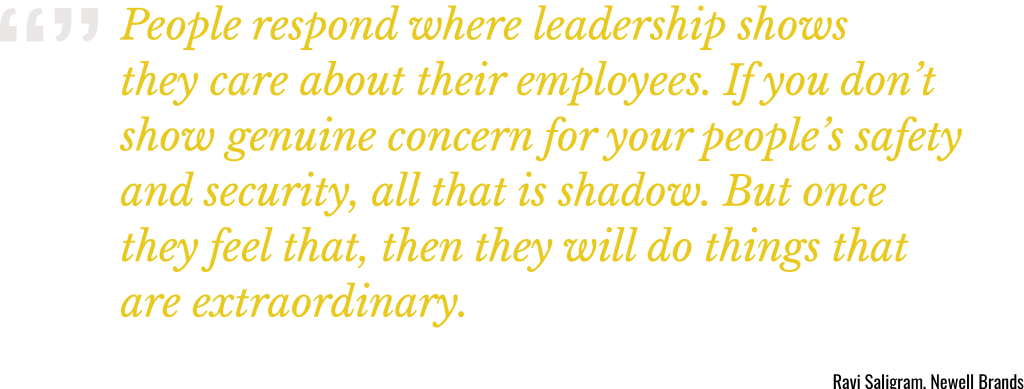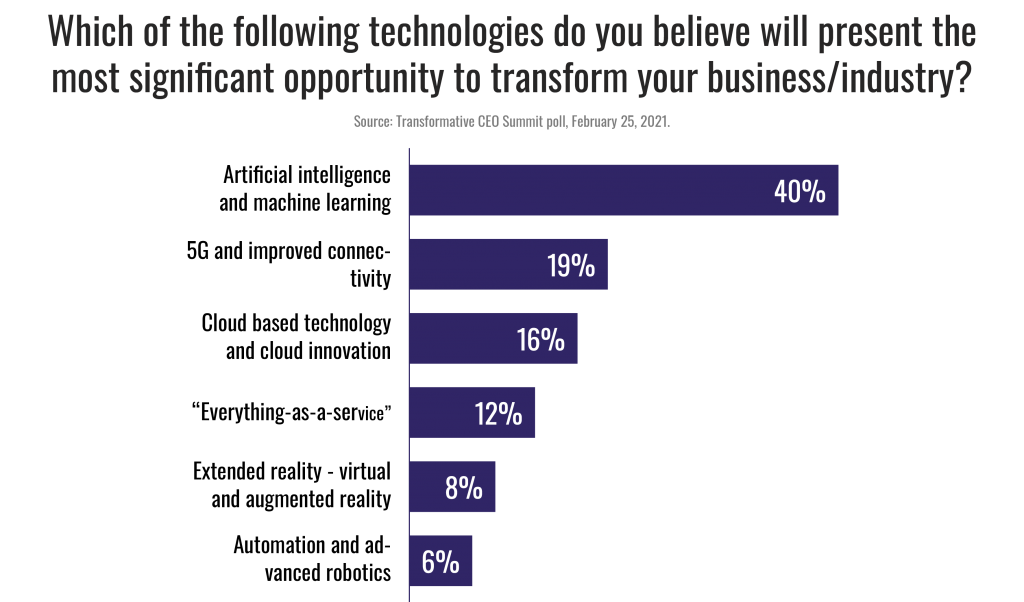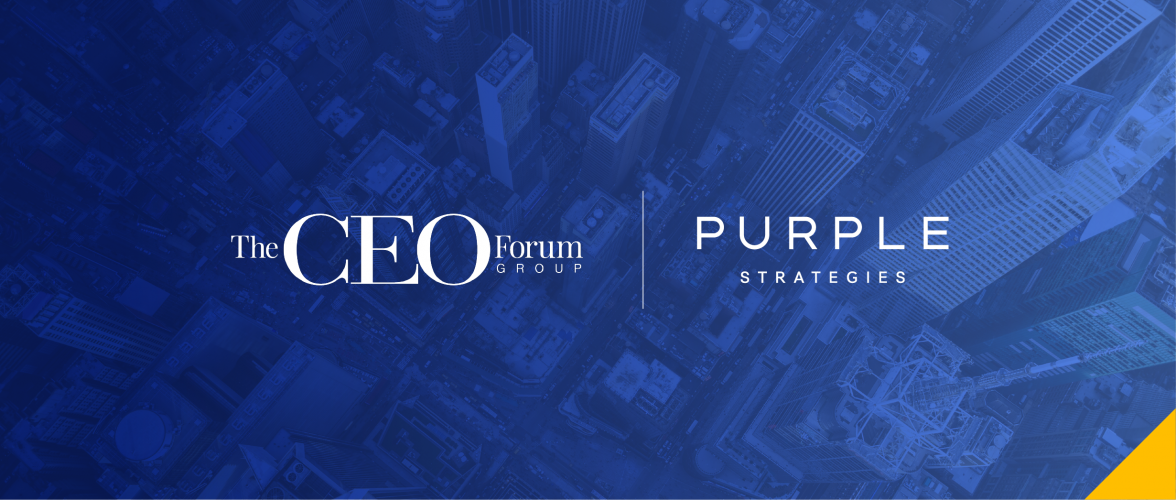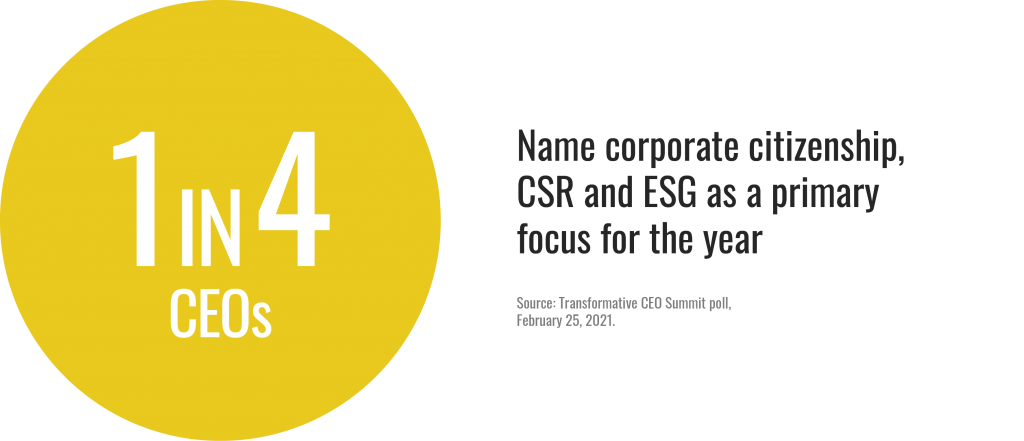5 Themes from The CEO Forum’s First Transformative CEO Summit
Purple Strategies is the thought leadership and polling partner of The CEO Forum Group and Transformative CEO Summit. The CEO Forum convened its inaugural Transformative CEO Summit on February 25, 2021, featuring more than 50 CEOs of leading companies discussing creative ways to solve today’s most pressing challenges. This article first appeared in the digital magazine of the inaugural Summit.
When the CEOs of more than 50 leading companies gathered for the first-ever Transformative CEO Summit to suggest and debate creative approaches to addressing today’s most pressing challenges, the anniversary of the start of the COVID era was near.
And while the pandemic didn’t have a slot on the Summit agenda, its lessons and legacy wove through the keynotes and discussions as a strong and distinctive thread: The importance and resurgence of human connection emerged from transformative CEOs as the unifying lens through which these leaders reflect on the unprecedented events of the past year and look ahead with optimism and renewed purpose.
In a year when “success” required the world to avoid close physical contact and to shift to a digital-first posture, our shared experience characterized by the lack of human connection crystallized for CEOs the myriad ways human connection can be differentiating for a company as we enter this next era. Whether discussing technology, finance, corporate citizenship or any other topic, the CEOs repeatedly surfaced an array of elements of human connection as being critical to advancing the goals of their organizations and meeting their obligations to society – as individuals and as corporations.
The following forces related to connection are ones transformative CEOs recognize as shaping the business landscape at this moment.
(1) A new era of empathy.
Business leaders across industries recognized that COVID has ushered in a new era of empathy, in which business itself must play a central role in prioritizing the physical and emotional wellbeing of all stakeholders – employees, customers, partners, suppliers, and the communities in which they operate. As companies look to re-open and in some cases reinvent their industries, leaders will be particularly attuned to the safety and security of their employees, for whom continued corporate empathy will be integral to their business success and driving toward strong reputation outcomes, including trust and talent recruitment/retention.

(2) The promise of a deeper, more human embrace of tech.
COVID significantly impacted businesses’ reliance on technology, as many were forced to adopt or accelerate their adoption of digital solutions in order to compete, or even simply survive. Recognizing that rapid technological change is never without disruptions, industry is now looking to the convergence of the physical and digital world – the “phygital” space – to combine technology with human intellect and drive competitive advantage and continued business transformation.

(3) An inflection point for Purpose.
While corporate America has signaled its intention to move beyond shareholder primacy and instead serve a broader mix of stakeholders, COVID accelerated the need for businesses to translate Purpose into action. Companies that responded to the moment adopted flexible work-from-home policies, found ways to support single parents and those struggling with childcare, offered discounts and deals to offset the financial strain many were feeling, and prioritized employee health and safety. As they move beyond this moment, leaders stressed the importance of continuing their commitment to serving a full coalition of stakeholders and defining their Purpose through action.

(4) Urgent acceleration of focus on diversity, equity and inclusion.
The recent and overdue reckonings around racial justice and gender inequality forced companies to look in the mirror and across the boardroom to evaluate whether their stated corporate values matched their business realities. The lack of diversity among the CEO population itself is an important reminder of the significant gap between the two. Transformative leaders are resolved that the private sector must shift away from talking points in favor of tangible action to address inequalities across industry sectors (and particularly in finance, healthcare, education and tech); bring about greater representation and diversity in the executive ranks and boardrooms; and charge every employee in moving companies in a positive direction.
(5) A new and enduring legacy of crisis preparedness.
The ongoing global pandemic delivered a wake-up call to corporate leaders that this type of event can and will come again, and the organizations that will survive in the long-term are those that are already preparing for the next crisis event. While society more generally might yearn for a “return to normal” there is little room among executives for nostalgia to go back to the way things were before. Transformative leaders are approaching decision-making and forecasting with the lens of when not if. Proactively preparing for the inevitable next global catastrophe will demand that companies assume a culture of innovation and a willingness to adapt that will be key to their survival.

Leaders at the Transformative CEO Summit helmed their companies through an unprecedented crisis that upended the business world (not to mention every facet of society), and convinced them of the certainty of crises to come. Despite this, many of these leaders expressed a sense of optimism – optimism in their ability to reinvent their industries and play a role in rebooting society in the wake of massive disruption, and optimism in their ability to confront and navigate future challenges. For proof and inspiration, leaders pointed to previously unseen cross-industry collaboration, technological adoption, agility in decision-making, and building a culture of “yes” – in some cases overnight – to adapt to this disruption.
They revisited their values; prioritized corporate citizenship, diversity, and inclusion; and challenged themselves to manifest Purpose through action, for all of their stakeholders. CEOs hope to enshrine the lessons learned over the last year, along with greater appreciation of human connection, through their leadership well beyond COVID.
Purple Strategies is the thought leadership and polling partner of The CEO Forum Group and Transformative CEO Summit. Purple formed 12 years ago when two political firms that were asked regularly to partner together to bring a mix of “Red” and “Blue” perspectives to corporate challenges decided to join forces. Through the years Purple has continued to evolve, bringing in diverse perspectives across a multitude of disciplines. Today, Purple is an independent, fully integrated corporate reputation strategy firm, inspired by politics, driven by data and insights, partnering with clients around the world to anticipate, navigate, and compel change. Purple blends the creativity of brand communications and the speed and strategy of political campaigns to serve Fortune 500 companies, coalitions, associations, non-profits, and some of the most recognizable brands in the world.


 AI and Paradigm Shifts on the Minds of Healthcare CEOs
AI and Paradigm Shifts on the Minds of Healthcare CEOs  Purple Strategies Elevates Three To Partnership Group
Purple Strategies Elevates Three To Partnership Group